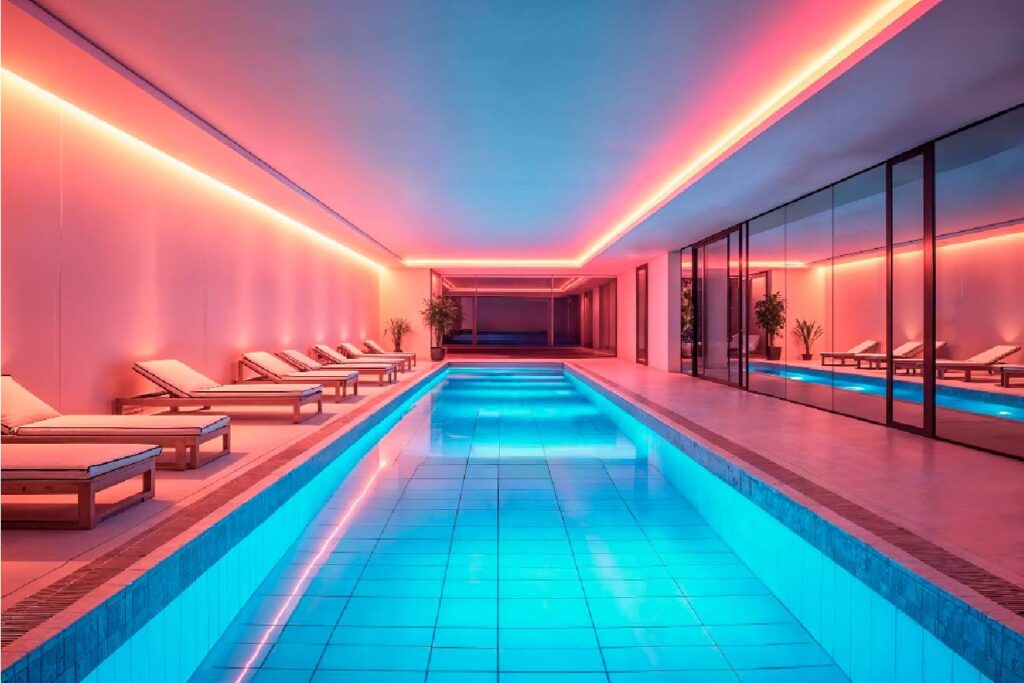Indoor swimming pools are one of the key amenities that offer guests year-round swimming enjoyment. However, these areas constantly generate high humidity. Evaporating water increases the moisture level in the air, which can cause various problems for both structural integrity and comfort. This is exactly where pool dehumidification air handling units come into play. So, why should hotels use dehumidification units for their pools? Let’s examine this from technical, economic, and comfort perspectives.
Prevention of Structural Damage
The moisture created by evaporating water in indoor pools can penetrate walls, ceilings, and other structural elements. Over time, this leads to:
- Bubbling and peeling on concrete and plaster surfaces,
- Corrosion on metal surfaces,
- Rotting and deformation in wooden materials.
Dehumidification units keep indoor humidity at ideal levels, preventing such structural deterioration. For hotel management, this means avoiding costly long-term maintenance and repair expenses.
Providing a Comfortable Environment
High humidity creates an uncomfortable atmosphere for guests, including:
- Stuffy and heavy air due to evaporated water,
- Sweating sensation and stickiness,
- Irritation in eyes and respiratory tract.
Pool dehumidification units balance temperature and humidity, enhancing guest comfort, which directly improves customer satisfaction.
Energy Efficiency and Heat Recovery
Modern dehumidification units not only control humidity but also provide energy savings through heat recovery systems. For example:
- Moist air extracted from the environment transfers its heat energy to incoming fresh air, reducing energy consumption.
- Some dehumidifiers can also heat pool water, offering additional energy savings.
These systems enable hotels to optimize heating and ventilation costs, adopting an eco-friendly approach while lowering operational expenses.
Maintaining Pool Hygiene
High humidity fosters mold and fungal growth, which cause unpleasant odors and serious health issues. With dehumidification units:
- Mold and fungal growth are prevented,
- Risk of bacterial contamination decreases,
- A healthier and more hygienic pool environment is maintained.
Extending Equipment and Hardware Lifespan
Electronics, lighting, and other technical equipment in indoor pool areas are vulnerable to humidity. Excess moisture can cause short circuits, oxidation, and malfunctions. Using dehumidification units prolongs equipment life and reduces maintenance costs.
Compliance with Regulations and Standards
Many countries and regions have specific standards for indoor pool climate control. Fire safety, building, and hygiene regulations often include humidity control requirements. Dehumidification systems play a key role in meeting these standards.
Conclusion: Not an Investment but a Necessity
A pool dehumidification unit is not a luxury for hotels but a necessity for sustainable operation, guest satisfaction, and structural health. A properly sized and regularly maintained system:
- Protects the hotel’s physical structure,
- Enhances guest experience,
- Optimizes energy consumption,
- Provides long-term savings.
If your hotel has an indoor swimming pool, we highly recommend consulting with a professional HVAC engineer to plan an appropriate dehumidification system.
Keywords
hotel pool dehumidification unit, indoor pool humidity control, pool HVAC systems, energy efficient pool climate control, hotel indoor air quality, pool moisture removal, heat recovery pool dehumidifier, pool environment comfort, structural protection indoor pools, pool hygiene systems
